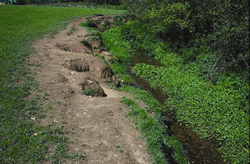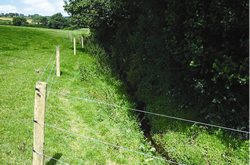You are here
Westcountry Rivers Trust
Looking after the river and your interests
 The Westcountry Rivers Trust is an environmentally charity established in 1995 to secure the preservation, protection, development and improvement of rivers, streams and watercourses in the Westcountry and to advance the education of the public in the management of water.
The Westcountry Rivers Trust is an environmentally charity established in 1995 to secure the preservation, protection, development and improvement of rivers, streams and watercourses in the Westcountry and to advance the education of the public in the management of water.
The Trust’s vision is to have living, working landscapes that deliver employment, food and amenity without impacting on rivers and biodiversity and without the need for heavy regulation and supervision.
The trust is one of the most active conservation organisations in the country. The greatest part of our work to date has been farm management advice targeted to reduce agricultural pollution, work which is not within the remit of any of our statutory agencies. To achieve this goal we undertake catchment scale projects, which are designed to foster environmentally sensitive farming, driven by financial savings in farming systems. To date we have worked in nearly 20 Westcountry catchments achieving almost complete coverage of all agricultural land within the catchments and we have worked with farmers to solve many problems contributing to diffuse pollution. The headline achievements from these projects are as follows:
- 1800+ farmers & landowners given advice
- 1380+ Integrated Land & River Management Plans
- Over 95,000 ha of land targeted with management advice
- 235 km+ vulnerable riverbank fenced
- 16 wetlands restored/improved
- 85+ km ditches prioritised for re-vegetation
- 350+ sites of accelerated erosion controlled
- 35 demonstration sites developed and operational
- 270+ sites of habitat improvement
- 50+ buffer zones created
Trust staff are also delivering advice on the new Cross Compliance rules which farmers must observe to receive their single farm payment. The rules are complex and the Trust is helping farmers to interpret them to achieve the best outcome for their business and the environment. Trust staff also give advice on accessing the new agri-environment payments called ‘Entry Level Scheme’ and ‘Higher Level Scheme’. By committing to one of these schemes farmers agree to decrease some areas of productivity and alter some practices for environmental benefit. The Trust assists in this wherever possible and we try to ensure rivers and the water resource feature highly in everyone’s priorities.
The Trust also has a hard working education team. In 2006 the Team are pushing forward with primary and secondary school visits and with the teaching of the Trusts newly accredited foundation degree, based at Duchy College. The first year students on the degree course are progressing well and are currently being put through their paces on ‘good soil management practices’. This is just one of the elements making up the degree course in Sustainable River Basin Management. We hope that the students graduating will be tailor made to fit new opportunities presented by the Water Framework Directive. This directive is designed to deliver joined up thinking on water resource protection and the Trust is again at the forefront of its implementation.
The Trust also has a thriving Fisheries function with a very active research arm. Much of the research is based at Exeter University and is largely concerned with salmonid ecology. This work has expanded in recent years to the extent that we are now recognised, jointly with Exeter University, as a leading fisheries research institution. We are asked to provide opinions at the highest level on issues of fisheries management in the UK and internationally. The fisheries team, in collaboration with Kings College London, are also leading the way nationally, investigating the causes for the huge declines in European eel numbers. Trust staff have set up eel traps on rivers and are recording the size age, sex and parasite load of eels entering and leaving rivers. This should lead to a better understanding of precisely which life stage of the eel appears to be under pressure. An international eel symposium is to be held by the Trust in collaboration with the national Association of Rivers Trusts at London Zoo in April 2006.
 These lofty undertakings may not, at first sight, seem relevant to the Westcountry but the causes of these problems are often found far away and it is part of the Trusts ethos to tackle problems at their source rather than trying to manage the symptoms.
These lofty undertakings may not, at first sight, seem relevant to the Westcountry but the causes of these problems are often found far away and it is part of the Trusts ethos to tackle problems at their source rather than trying to manage the symptoms.
The fisheries team also deliver lots of on-the-ground practical work to restore rivers and currently we have funding to focus effort on the Little Exe, which has seen declines in salmon juvenile numbers. Practical work will also be carried out on many other Westcountry rivers over the summer.
In addition to this 2006 will see another successful rollout of the Trusts Angling 2000 day ticket scheme. The Scheme was a stroke of genius dreamt up by Dr Simon Evans, the Trusts former head of fisheries. Simon found many miles of very good but under utilised fishing during his routine visits to farms around the Westcountry. The Trust approached the owners of the fishing and offered a free advisory visit and a marketing service for the fishery. The scheme has since gone from strength to strength and day tickets for all the beats in Devon and Cornwall can be bought online, by mail or from the office. The beauty of the scheme is that profits go straight back to the owner and the owner, in-turn looks after the river which is the net beneficiary. The scheme is now available on the rivers Wye and Eden and tickets are interchangeable between schemes. The Wild Trout Trust also sells tickets. The scheme offers truly wild fishing on banks seldom trod and is a must for any really spiritual angler who hankers after a wild experience.
As you can, see the Trust works hard on many fronts to achieve its vision. The Trust can, however, only operate with the help of its supporters and the trusts work is only relevant if it represents the needs and aspirations of its supporters. With this in mind we hope to communicate with you as regularly as we can about our work. We hope that in turn you will guide us to address your concerns and that you will direct others with similar concerns to our door so that they can become a supporter and help the Trust in pursuit of its vision.
Contact details for the Trust:
Dr Dylan Bright CBiol MIBiol
Director
Westcountry Rivers Trust, 10, Exeter Street, Launceston, Cornwall PL15 9EQ
Tel: + 44 (0) 870 774 06 91
[email protected]
Contact details for Angling 2000:
www.angling2000.org.uk
Toby Russell CEnv MIFM
Westcountry Rivers Trust, 10, Exeter Street, Launceston, Cornwall PL15 9EQ
Tel: + 44 (0) 870 774 06 96
[email protected]
Or visit the Trust website at:
